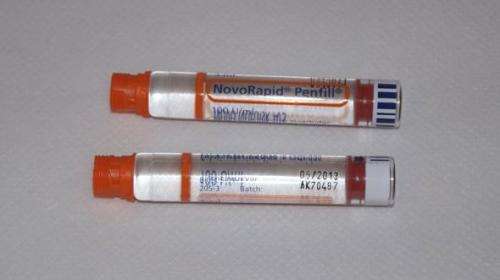Melatonin and mealtime: Common genetic difference could put some at greater risk of diabetes

Researchers from Brigham and Women's Hospital (BWH) and the University of Murcia, Spain, have shed new light on why people who carry a common genetic mutation may be more at risk for developing type 2 diabetes. By carefully studying healthy subjects, researchers were able to chart the effect of melatonin supplements on blood sugar control. Their results, reported in Metabolism, suggest that taking melatonin close to mealtimes may put people with a common genetic variant more at risk.
"Our work is the first to show that a person's genetic profile could impact their ability to tolerate glucose when they take melatonin," said co-corresponding author Frank Scheer, PhD, associate professor of medicine at Harvard Medical School and the Director of the Medical Chronobiology at BWH.
"Our results suggest that we may need to exert caution when taking melatonin close to meal times, especially in carriers of the risk variant," said co-corresponding author Marta Garaulet, PhD, a full professor of Physiology at the University of Murcia.
As many as 50 percent of people of European ancestry carry this genetic variation in MTNR1B, a gene that encodes a melatonin receptor. Previous studies have found that this mutation increases a person's risk of diabetes, but exactly how and why it influences blood sugar control has remained poorly understood and has mostly been studied during the daytime, when naturally occurring melatonin concentrations are very low.
Scheer, Garaulet and their colleagues studied members of a female rugby team at the University of Murcia to investigate the effects of taking melatonin supplements on blood sugar levels. By looking at a small group of similar subjects, the research team could narrow in on the effects of melatonin and limit other possible causes of differences in results. Each recipient received either a dose of melatonin or a placebo in the morning (9 a.m.) and evening (9 p.m.), followed by a large dose of glucose, a so called oral glucose tolerance test. Blood samples were taken before and at 30-minute intervals after they received the glucose doses for the next two hours.
Of the 17 participants, 11 were carriers of the genetic risk variant and six were not. The research team found that in the morning, the effects of melatonin on ability to control blood sugar levels differed significantly between the two groups, finding that the carriers' ability to control blood sugar levels was six times worse than non-carriers'. In the evening, no significant differences were found between the two groups. The absence of the effect in the evening may have been due to a limited sample size.
"Our data suggest that when subjects take melatonin, the genetic risk variant in MTNR1B causes a much greater change in glucose tolerance in carriers compared to non-carriers, even in people who are not obese and not diabetic," said Scheer. "Our results suggest that it may be important to take genetics into account when thinking about timing of food consumption and melatonin administration." The team notes that further, large-scale studies will be needed in vulnerable populations before clinical recommendations can be made.
More information: Garaulet M et al. "Common Type 2 diabetes-risk variant in MTNR1B worsens the deleterious effect of melatonin on glucose tolerance in humans." Metabolism. DOI: 10.1016/j.metabol.2015.08.003
















